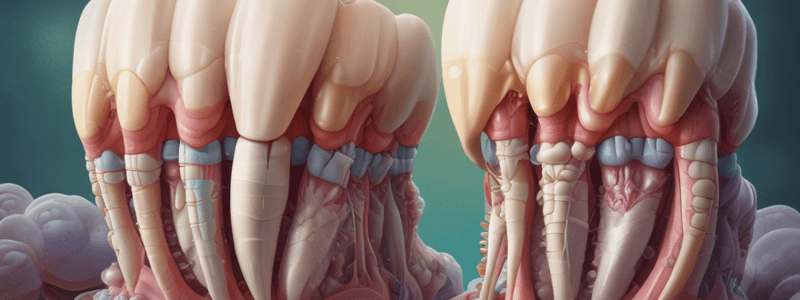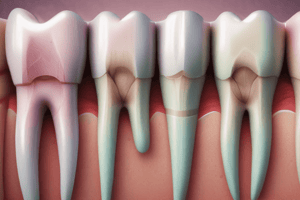Podcast
Questions and Answers
What is the primary cause of periodontal disease?
What is the primary cause of periodontal disease?
- Environmental factors
- Smoking
- Plaque (correct)
- Diabetes
At which stage of gingivitis do the B cells step up to the plate?
At which stage of gingivitis do the B cells step up to the plate?
- Stage one
- Stage four
- Stage two
- Stage three (correct)
What happens to the T lymphocytes in stage two of gingivitis?
What happens to the T lymphocytes in stage two of gingivitis?
- They disappear
- They wait for stage three
- They are replaced by B cells
- They attack the early lesions (correct)
What is the result of bone loss in stage four of gingivitis?
What is the result of bone loss in stage four of gingivitis?
What are the clinical changes associated with gingivitis?
What are the clinical changes associated with gingivitis?
What is the main characteristic of stage four of gingivitis?
What is the main characteristic of stage four of gingivitis?
What is the primary role of Neutrophils in the immune response to periodontal bacteria?
What is the primary role of Neutrophils in the immune response to periodontal bacteria?
How do Neutrophils migrate from blood vessels to the periodontal pocket?
How do Neutrophils migrate from blood vessels to the periodontal pocket?
What is the mechanism by which Neutrophils internalize bacteria?
What is the mechanism by which Neutrophils internalize bacteria?
What is the name of the enzyme involved in the destruction of periodontal tissues?
What is the name of the enzyme involved in the destruction of periodontal tissues?
Which antibiotic is known to inhibit MMP 8?
Which antibiotic is known to inhibit MMP 8?
What is the result of defective neutrophil chemotaxis?
What is the result of defective neutrophil chemotaxis?
What is the function of the biologic bleach released by Neutrophils?
What is the function of the biologic bleach released by Neutrophils?
What is the role of Neutrophils in the immune response to periodontal bacteria?
What is the role of Neutrophils in the immune response to periodontal bacteria?
What is the name of the bacteria that causes the A form of periodontitis?
What is the name of the bacteria that causes the A form of periodontitis?
What is the function of macrophages in the immune response?
What is the function of macrophages in the immune response?
What is the role of T helper cells in the immune response?
What is the role of T helper cells in the immune response?
What is the function of natural killer cells?
What is the function of natural killer cells?
What is the role of matrix metalloproteinases in periodontal disease?
What is the role of matrix metalloproteinases in periodontal disease?
What is the first stage of the pathogenesis of gingivitis?
What is the first stage of the pathogenesis of gingivitis?
What is the role of neutrophils in the immune response?
What is the role of neutrophils in the immune response?
What is immunoglobulin E associated with?
What is immunoglobulin E associated with?
What is the name of the glycoprotein found on the surface of T helper cells?
What is the name of the glycoprotein found on the surface of T helper cells?
What is the balance between in the immune response?
What is the balance between in the immune response?
Flashcards are hidden until you start studying
Study Notes
Immune Cells in Periodontal Response
- Neutrophils are the first line of defense and play a crucial role in controlling bacterial challenges and destroying periodontal tissue.
- They migrate from blood vessels to the periodontal pocket via chemotaxis and form a barrier to protect the body from pathogenic bacteria.
- Neutrophils internalize bacteria via phagocytosis and kill them using biologic bleach, which is a mix of nasty chemicals, including myeloperoxide and oxygen radicals.
- Neutrophil gelatinase (MMP-8) is involved in the destruction of periodontal tissues and is inhibited by the antibiotic tetracycline.
Neutrophil Abnormalities
- Defective neutrophil chemotaxis can lead to aggressive periodontitis.
- Abnormalities in neutrophil function can result in a "lose-lose" situation, where too much neutrophil activity leads to tissue destruction, and too little activity leads to unchecked bacterial growth.
Macrophages
- Macrophages are antigen-presenting cells that regulate the immune response by releasing cytokines like IL-8.
- They also include monocytes and dendritic cells.
Mast Cells
- Mast cells are involved in vascular permeability and dilation of blood vessels.
- They produce IgE, which is an antibody famously produced by mast cells.
Lymphocytes
- Lymphocytes are a category of immune cells involved in the periodontal response.
- B cells become plasma cells and make antibodies.
- T helper cells (CD4 cells) help with communication between immune cells.
- T cytotoxic cells (CD8 cells) directly kill intracellular antigens.
- Natural killer cells (NK cells) recognize and kill tumor and virally infected cells.
Pro-Inflammatory Mediators
- Pro-inflammatory mediators, such as MMPs, favor the destructive nature of periodontal disease.
- MMPs are matrix metalloproteinases that destroy collagen, the most common protein in the human body, leading to localized tissue damage.
Anti-Inflammatory Mediators
- Anti-inflammatory mediators oppose tissue destruction and are involved in a constant balance with pro-inflammatory mediators.
Stages of Gingivitis
- The initial lesion (2-4 days) involves neutrophil infiltration.
- The early lesion (4-7 days) involves T lymphocyte infiltration.
- The established lesion (14-21 days) involves B cell infiltration and maturation into plasma cells.
- The advanced lesion (stage 4) involves transition to irreversible tissue damage, characterized by bone loss and clinical changes in color, contour, and consistency.
Studying That Suits You
Use AI to generate personalized quizzes and flashcards to suit your learning preferences.




